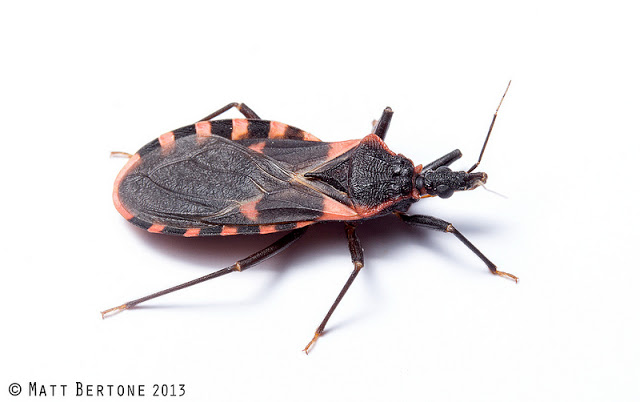Press release (via Dee Shore, N.C. State University):
HOW CONCERNED SHOULD YOU BE ABOUT KISSING BUGS?
HERE’S WHAT NC STATE EXPERTS HAVE TO SAYRecent news reports that a “deadly” bug has been found in North Carolina seem to be causing unnecessary alarm, according to NC State University entomologists. That’s because many people are getting the disease-carrying triatomine bug, or kissing bug, confused with other bugs.
The kissing bug is known to carry a parasite that causes Chagas disease, which affects millions of people a year, mainly in Central and South America, says Dr. Matt Bertone, with NC State University’s Plant Disease and Insect Clinic. But, he adds, “In North Carolina, you have almost no chance of contracting the disease from these native bugs.”
Bertone and Dr. Michael Waldvogel, a professor and specialist with the North Carolina Cooperative Extension Service at NC State, say they’ve been inundated with calls and messages concerning the kissing bug, and the main thing they want people to know is that using pesticides to guard against the bug is unnecessary.
As Bertone explains in a blog post at http://ncsupdicblog.blogspot.com/, cases in the United States are rare, and most have been diagnosed from people who traveled here from outside the country.
Instead of using pesticides, Waldvogel recommends the following strategies for keeping kissing bugs from entering homes, especially in rural areas where there are more mammal hosts:
- Reduce the amount of debris and vegetation directly around the home; wood and leaf piles, stacked rocks and other habitats that attract rodents can also harbor the bugs.
- Repair cracks and gaps in homes; use weather stripping on points of entry such as windows and doors, and make sure window screens are intact and holes are repaired.
- If you suspect kissing bugs are in your home, inspect racks and tight spaces, specially in bedrooms
- Because lights will sometimes attract kissing bugs, minimizing the amount of lights on at night will help to “cloak” homes.
But as Bertone points out, “Although these preventive measures will help reduce the chances of coming into contact with kissing bugs, in reality it is very unlikely you would ever come into contact with one of these insects anyway.”
In his blog post, Bertone explains there are two species of kissing bugs that are native to the state and feed on the blood of vertebrate hosts. Their name comes from the fact that when the bugs feed on humans at night, they prefer the face, specially the lips and eyes. Their bites don’t initially hurt but often become itchy, swollen and sometimes painful.
Kissing bugs are around one inch long when fully grown and somewhat flattened when not fed. They don’t have mandibles or chewing mouthparts, but instead they have a long, straw-like rostrum used to suck liquids.
The sides of their abdomen and thorax are striped, alternating black and orange/red (sometimes even pink in hue), Berton writes. “The legs of kissing bugs are thin compared to most assassin bugs, likely because they do not need to grab prey but instead must be able to move quickly.”
The U.S. Centers for Disease Control recommends that if you think you’ve found a kissing bug, to not touch or squash it. Instead, place a container on top of the bug, slide the big inside and fill the container with rubbing alcohol or, if alcohol is not available, freeze the bug in the container. Then you can take it to your county Cooperative Extension center, health department or university lab, such as NC State’s Plant Disease and Insect Clinic.
— Dee Shore




Before you comment
The comments section is here to provide a platform for civil dialogue on the issues we face together as a local community. Xpress is committed to offering this platform for all voices, but when the tone of the discussion gets nasty or strays off topic, we believe many people choose not to participate. Xpress editors are determined to moderate comments to ensure a constructive interchange is maintained. All comments judged not to be in keeping with the spirit of civil discourse will be removed and repeat violators will be banned. See here for our terms of service. Thank you for being part of this effort to promote respectful discussion.